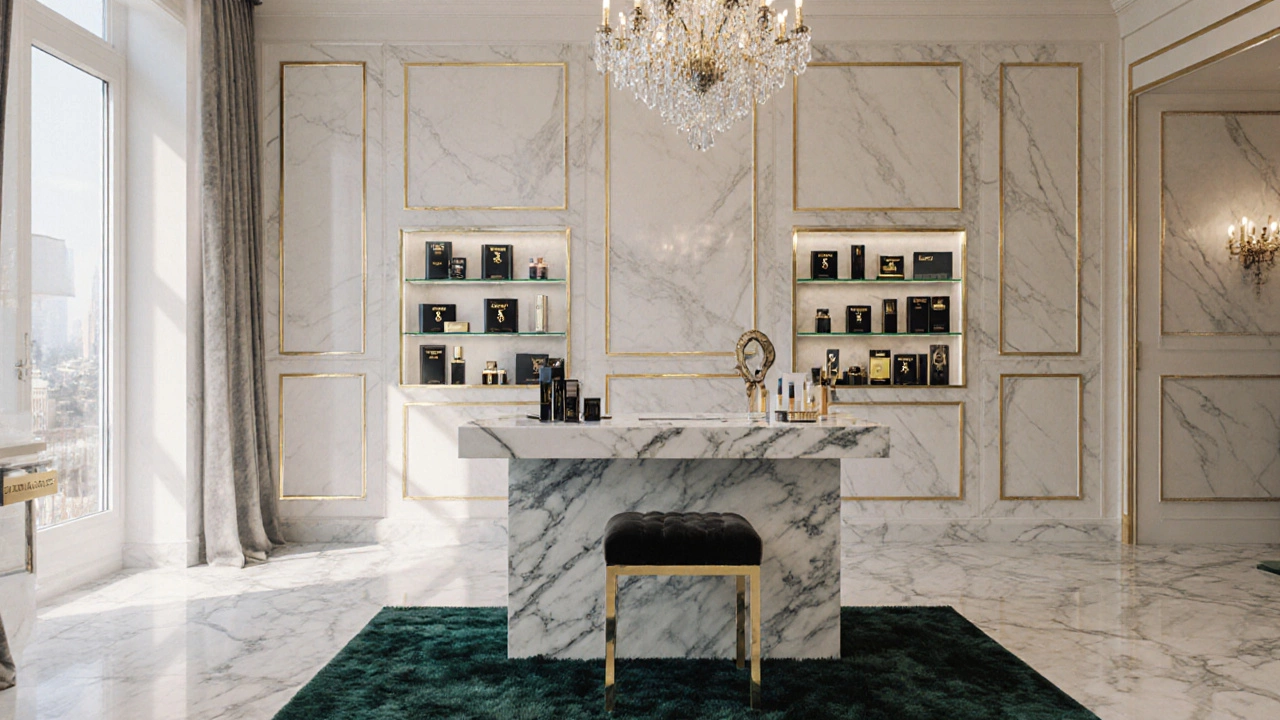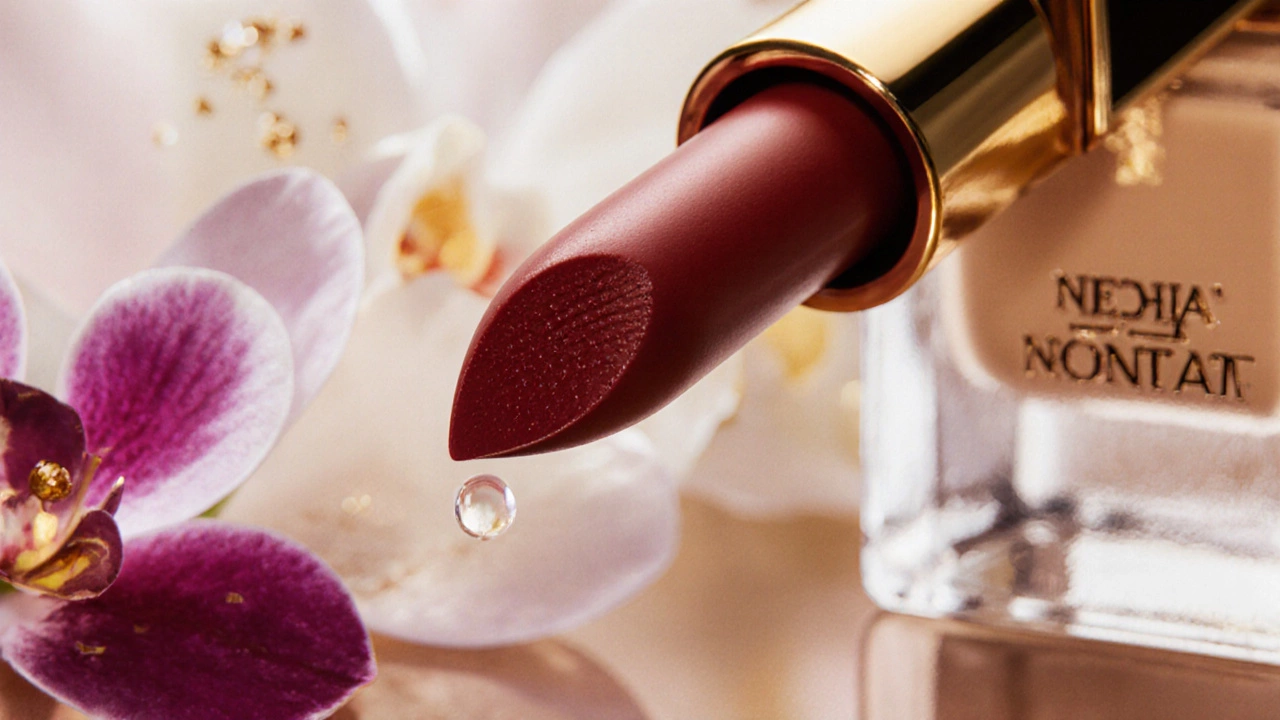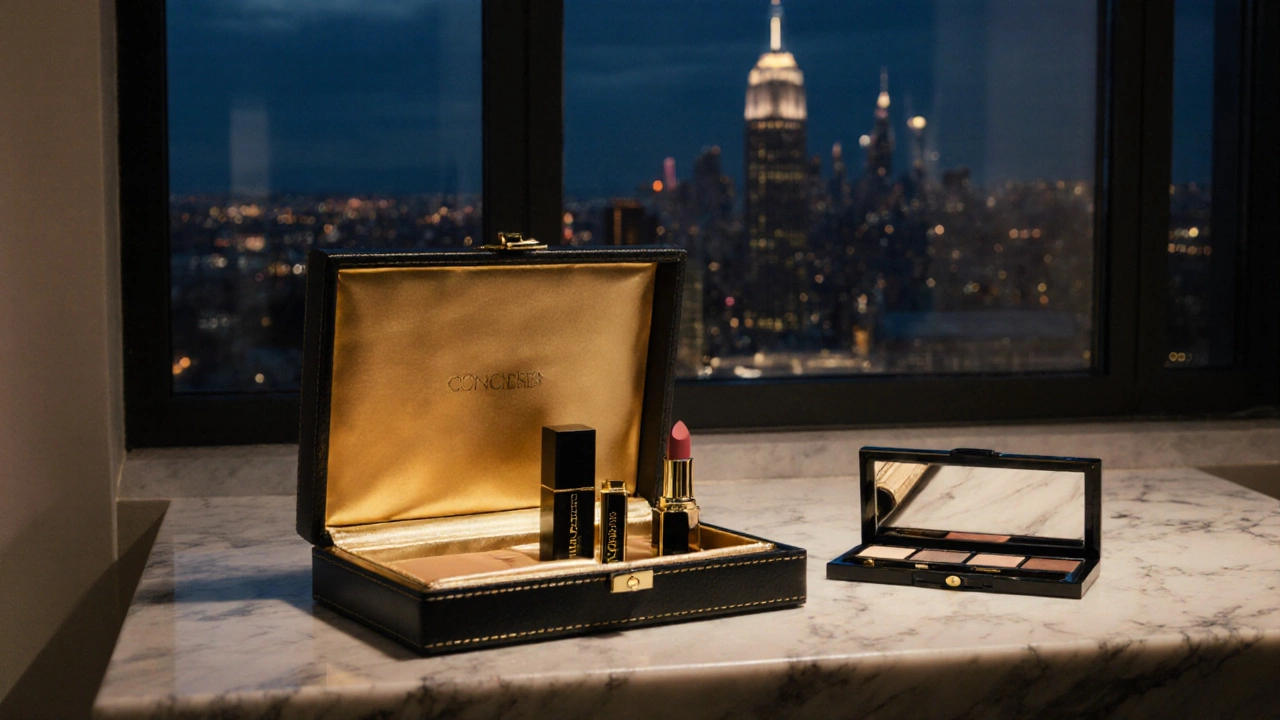
Luxury Makeup Brand Explorer
Discover the key attributes of top luxury makeup brands and their signature offerings.
Tom Ford Beauty
$55-$115
Signature Ingredient: Cochineal & Silk Proteins
Popular With: Rihanna, Gigi Hadid
Chanel
$78-$130
Signature Ingredient: Camellia Oil
Popular With: Kylie Jenner, Marion Cotillard
Dior
$55-$70
Signature Ingredient: Vitamin E & Perlite
Popular With: Jennifer Lawrence, Beyoncé
Guerlain
$84-$115
Signature Ingredient: Real Orchid Extract
Popular With: Adele, Eva Green
Clé de Peau Beauté
$108-$150
Signature Ingredient: Japanese Pearl Powder
Popular With: Emma Stone, Penélope Cruz
| Brand | Flagship Product | Price Range (USD) | Signature Ingredient | Popular Celebrity Users |
|---|---|---|---|---|
| Tom Ford Beauty | Velvet Matte Lip Color | $55-$115 | Cochineal & Silk Proteins | Rihanna, Gigi Hadid |
| Chanel | Les Beiges Healthy Glow Foundation | $78-$130 | Camellia Oil | Kylie Jenner, Marion Cotillard |
| Dior | Forever Matte Foundation | $55-$70 | Vitamin E & Perlite | Jennifer Lawrence, Beyoncé |
| Guerlain | Orchidée Impériale Light Infusing Foundation | $84-$115 | Real Orchid Extract | Adele, Eva Green |
| Clé de Peau Beauté | Radiant Foundation | $108-$150 | Japanese Pearl Powder | Emma Stone, Penélope Cruz |
Why Luxury Makeup Commands Premium Prices
- Ingredient Rarity: Natural gold leaf, 24-carat-infused powders, ethically harvested pearls raise raw material costs dramatically.
- Research & Development: Luxury houses invest millions into R&D to create skin-care-grade formulas that meet both cosmetic and dermatological standards.
- Limited Production Runs: Many brands release seasonal collections in runs of 5,000–10,000 units, creating scarcity and higher unit costs.
- Packaging Materials: Hand-blown crystal bottles, heavyweight acrylic, and bespoke caps are significantly more expensive than standard plastic.
- Brand Heritage & Marketing: Celebrity endorsements and high-visibility runway shows add overhead that is distributed across the finished product.
- Travel-size & Mini Versions: Most brands release 5 ml or 7 ml versions for holiday gifting. They contain the same formula at a fraction of the price.
- Seasonal Sampler Sets: Dior’s “Mini Collection” and Tom Ford’s “Beauty Travel-Kit” bundle popular items for under $200.
- Exclusive Beauty Subscription Boxes: High-end boxes like “Lux Beauty Club” feature one or two premium products per quarter, providing a low-risk way to test new shades.
- Second-hand Luxury Marketplaces: Platforms such as TheRealReal verify authenticity and often list barely-used items at 30-50% off retail.
- In-store Events: Brands host launch parties where attendees receive complimentary mini products. Signing up for brand newsletters is the quickest way to receive an invitation.
Quick Summary / Key Takeaways
- Wealthy consumers gravitate toward a handful of legacy luxury houses like Tom Ford Beauty, Chanel, and Dior.
- Signature items-silky foundations, richly pigmented lipsticks, and buttery eyeshadows-justify their high price tags through rare ingredients and exclusive formulation.
- Prices typically start at $70 for a single product and can exceed $300 for limited‑edition collections.
- Top‑tier boutiques, private concierge services, and selective online platforms are the main buying channels.
- Smart shoppers can still enjoy luxury experiences via travel‑size versions, seasonal samples, and curated subscription boxes.
Ever wondered why a simple tube of lipstick can cost more than a dinner for two? The answer isn’t just about brand name-it's about the whole ecosystem of ingredients, craftsmanship, and the status signal that comes with luxury makeup. In this guide we’ll unpack exactly what the affluent choose for their daily glam, why those products command premium prices, and how you can tap into that world without blowing your budget.
Top Luxury Makeup Brands Favored by the Wealthy
When you walk into a high‑end department store in NewYork, Paris, or Sydney, there’s a recognizable line-up that instantly signals opulence. Below are the most coveted houses, each with a legacy that stretches decades, if not centuries.
Tom Ford Beauty is a modern luxury powerhouse founded in 2005, renowned for its bold color palettes and sleek packaging. The brand's Velvet Matte Lip Color and Traceless Foundation have become staples on celebrity red‑carpet looks.
Chanel launched its first cosmetics line in 1924, extending the same timeless elegance found in its couture. The Les Beiges Healthy Glow Foundation and Rouge Coco lipstick are celebrated for their wearable shade ranges.
Dior entered the makeup arena with the iconic Dior Addict line in the late 1990s. Its Forever Matte Foundation and Dior Lip Glow have a cult following among affluent shoppers seeking long‑lasting wear.
Guerlain brings a heritage of perfume craftsmanship into cosmetics. The Orchidée Impériale Light InfusingFoundation and Rouge GLipstick showcase the brand’s use of botanical extracts and precious metals.
Yves Saint Laurent (YSL) debuted its beauty range with the iconic Touche Éclat highlighter. The Couture Lipstick and All Hours Foundation continue to attract high‑net‑worth clients who value runway‑ready intensity.
Clé de Peau Beauté is a Japanese luxury line that blends skincare technology with makeup. The Radiant Foundation and Lustrous Lip Color are prized for their skin‑care‑infused formulas.
Sisley started as a skincare brand in the 1970s but quickly earned a reputation for high‑performance color cosmetics. The Sisley Paris Lipstick and PureGlowFoundation use plant‑based actives for a luminous finish.
Giorgio Armani Beauty merges the Italian designer’s sleek aesthetic with cosmeceutical ingredients. The Luminous Silk Foundation is a favorite for its feather‑light texture and silk‑derived pigments.

Signature Products and Their Premium Features
Luxury isn’t just about a fancy label; it’s reflected in the formulation, packaging, and user experience of each product.
- Foundations: High‑end foundations often include skin‑care actives such as hyaluronic acid, vitaminC, and peptide complexes. For example, Dior’s Forever Matte uses a polymer‑based matrix that locks pigment in place for up to 24hours while delivering antioxidant protection.
- Lipsticks: Brands like Tom Ford embed rare pigments (e.g., carmine from cochineal) and moisturizing butters sourced from sustainable farms. The result is a satin finish that feels as nourishing as a lip balm.
- Eyelids & Shadows: Guerlain’s Orchidée Impériale palette incorporates real orchid extracts, providing a luminous sheen that mimics natural light reflection.
- Highlighters: YSL’s Touche Éclat contains micro‑mica particles that scatter light without a glittery “caked” look, creating a subtle radiance prized on camera.
Packaging also plays a role. Heavy glass bottles, magnetic closures, and hand‑etched logos are not just aesthetically pleasing; they protect product integrity and signal exclusivity.
Price Breakdown: What Drives the Cost?
Understanding the price tag helps you decide if the added value aligns with your goals.
- Ingredient rarity: Natural gold leaf, 24‑carat-infused powders, and ethically harvested pearls raise raw material costs dramatically.
- Research & development: Luxury houses invest millions into R&D to create skin‑care‑grade formulas that meet both cosmetic and dermatological standards.
- Limited production runs: Many brands release seasonal collections in runs of 5,000-10,000 units, creating scarcity and higher unit costs.
- Packaging materials: Hand‑blown crystal bottles, heavyweight acrylic, and bespoke caps are significantly more expensive than standard plastic.
- Brand heritage & marketing: Celebrity endorsements and high‑visibility runway shows add overhead that is distributed across the finished product.
Typical price ranges:
- Foundations: $80-$300
- Lipsticks: $45-$150
- Eyelash serums & palettes: $70-$250
- Skincare‑infused makeup: $120-$350
Where the Rich Shop: Boutiques & Concierge Services
Purchasing luxury makeup is an experience, not just a transaction.
High‑net‑worth clients often visit flagship boutiques in upscale districts-think Rodeo Drive, Harrods, or Sydney’s Queen Victoria Building. These spaces provide personalized skin analysis, private sampling rooms, and on‑the‑spot custom shade matching.
For those who value discretion, many brands now offer concierge services. A client can schedule a home visit with a certified beauty advisor who brings a curated selection, performs a full makeup trial, and even ships the purchased items in a gold‑lined box.
Online, the most reputable platforms include Net‑A‑Porter’s Beauty Lab, Farfetch Beauty, and the official e‑commerce sites of the brands themselves. These sites often provide limited‑edition releases unavailable in brick‑and‑mortar stores.

How to Experience Luxury Makeup Without Breaking the Bank
You don’t have to drop six figures to taste luxury. Here are practical tactics:
- Travel‑size & mini versions: Most brands release 5ml or 7ml versions for holiday gifting. They contain the same formula at a fraction of the price.
- Seasonal sampler sets: Dior’s “MiniCollection” and Tom Ford’s “BeautyTravel‑Kit” bundle popular items for under $200.
- Exclusive beauty subscription boxes: High‑end boxes like “Lux Beauty Club” feature one or two premium products per quarter, providing a low‑risk way to test new shades.
- Second‑hand luxury marketplaces: Platforms such as TheRealReal verify authenticity and often list barely‑used items at 30‑50% off retail.
- In‑store events: Brands host launch parties where attendees receive complimentary mini products. Signing up for brand newsletters is the quickest way to receive an invitation.
Remember, the key is to focus on the product that matters most to your routine-whether that’s a flawless foundation or a signature lipstick-and allocate your budget there.
Comparison of Leading Luxury Makeup Brands
| Brand | Flagship Product | Price Range (USD) | Signature Ingredient | Popular Celebrity Users |
|---|---|---|---|---|
| Tom Ford Beauty | Velvet Matte Lip Color | $55‑$115 | Cochineal & Silk Proteins | Rihanna, GigiHadid |
| Chanel | Les Beiges Healthy Glow Foundation | $78‑$130 | Camellia Oil | KylieJenner, MarionCotillard |
| Dior | Forever Matte Foundation | $55‑$70 | VitaminE & Perlite | JenniferLawrence, Beyoncé |
| Guerlain | Orchidée Impériale LightInfusingFoundation | $84‑$115 | Real Orchid Extract | Adele, EvaGreen |
| Clé de Peau Beauté | Radiant Foundation | $108‑$150 | Japanese Pearl Powder | EmmaStone, PenélopeCruz |
Frequently Asked Questions
What makes a makeup brand “luxury”?
Luxury makeup combines rare, high‑quality ingredients, cutting‑edge research, meticulous packaging, and a heritage of exclusivity. The brands often invest heavily in brand storytelling and celebrity endorsements, which together create a premium experience beyond the product itself.
Are luxury foundations worth the price?
If you prioritize long wear, skin‑care benefits, and a flawless finish, many users find the investment pays off. High‑end foundations often contain hyaluronic acid, peptides, and SPF, functioning as both makeup and skincare in one step.
Where can I buy authentic luxury makeup online?
Official brand e‑commerce sites, Net‑A‑Porter Beauty Lab, Farfetch Beauty, and verified luxury department stores (Harrods, Selfridges) are safe bets. Always check for secure checkout and authenticity guarantees.
Can I test luxury makeup before buying?
Most flagship boutiques offer in‑store testing with professional makeup artists. Some brands also ship sample sizes on request. Additionally, beauty subscription boxes sometimes include trial‑size versions of high‑end products.
How do I store my luxury makeup to keep it fresh?
Store items in a cool, dry place away from direct sunlight. Heavy glass containers can be kept in a dedicated vanity drawer. For products with active ingredients (e.g., vitaminC), a temperature‑controlled cabinet extends shelf life.
 Hair Care
Hair Care